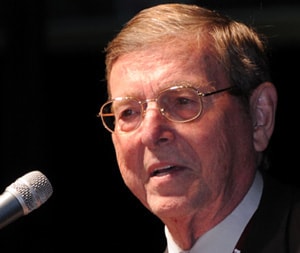
Former U.S. Sen. Pete Domenici, shown here in 2008. (Photo by Heath Haussamen)
While President Barack Obama took his health care reform message on the road over the weekend, retired Sen. Pete Domenici, who’s back in New Mexico for a week, says he doesn’t support creating a public option.
“I’m really worried about the bigger problem, which is the debt and the deficit. I think part of the drag that’s pulling down getting any place on the health care is that there’s an undercurrent of fear among our people about the debt and the deficit,” said Domenici, who was a senator from New Mexico for six terms until he retired last year.
Domenici, a Republican, said in an interview that he believes the current deficit crisis is more daunting to voters than health care reform, and the record debt is pulling New Mexicans away from reform and making it difficult for many to make sense of the health care bill.
“The biggest issues are how do you pay for it?” asked Domenici. “I don’t think the way (Obama) suggested to save $500 or $700 billion from Medicare or Medicaid makes very much sense to the American people.”
Domenici said that suggestion is “kind of incredulous,” because if such savings were possible they would have already been implemented.
Senior White House Adviser David Axelrod, who appeared on CBS’ Face the Nation on Sunday, said the president is standing by his promise that whatever bill he signs will not add to the nation’s deficit. During the program, Axelrod said the president “is absolutely committed that he will not sign a bill unless he can say to the American people honestly that this bill will not add to our deficit.”
Still, Domenici insists the deficit is a key element reforming health care in the country. Last month, Domenici, who is a senior fellow at the Bipartisan Policy Center (BPC), spearheaded the organization’s first major federal debt report, “Drowning in Red Ink.” That report called the size of the federal debt “unsustainable” and a “critical threat to America.”
While Domenici was Senate Budget Committee chairman, Congress produced three consecutive federal balanced budgets from 1998 to 2001 — the first time such a balance had been achieved in four decades.
In August, after Drowing in Red Ink was released, Domenici said it was time to take action to trim the deficit.
“The fiscal health of our nation is at stake. We can no longer continue on the present path of unprecedented deficits and debt,” Domenici said at the time. “Without dramatic changes in fiscal policy, America will find itself far weaker in the world, economically and strategically.”
Having a tough time but keeping busy
Domenici, 77, is in Albuquerque after recovering from surgery. The nine months since he retired have been difficult.
“I had a big operation and it was bigger than they thought. The recovery was very hard on me,” Domenici said. He added that he also misses being in the Senate.
Domenici didn’t mention that he’s also been in the news since his retirement because of the ongoing federal investigation into the U.S. attorney scandal. Earlier this year, a grand jury subpoenaed records from Domenici as part of its investigation, and some say charges against him are possible.
Regardless, the former senator is keeping busy. While in Albuquerque, he has received an update on the Bosque Restoration Project, for which he secured $27 million before leaving the Senate.
On Wednesday, he’ll be in Las Cruces for the 2009 Domenici Public Policy Conference at New Mexico State University. The second annual conference will focus on national issues including the U.S. economy and national debt, homeland security and the U.S./Mexico border, national security, and nuclear energy.
Among those scheduled to participate along with Domenici are U.S. Homeland Security Secretary Janet Napolitano and Joint Chiefs of Staff Vice Chairman Gen. James Cartwright.
Here’s video of Domenici’s interview:
A prior version of this posting incorrectly stated that Congress produced three consecutive balanced federal budgets in the 1980s.